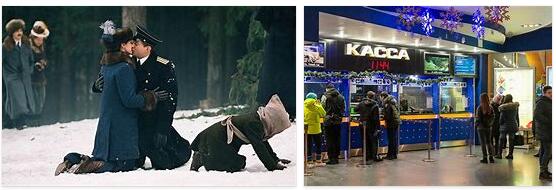CULTURE: CINEMA
In the years of the dissolution of the Soviet Union, that is from 1985 (year of the election of M. Gorbačëv as secretary of the CPSU) until 1991 (birth of the CIS), Russian cinema has undergone a radical transformation, but in truth, a little ‘as happened in post-Franco Spain, there have been few cinematographic works that have been able to tell this epochal political-social turning point. There are three films, all released in 1986, which testify to the uncertainties but also the hopes linked to the brief illusory season of perestroika : the most radiant and optimistic is Vasilij Pičul’s Little Vera, an American-style story of a teenager who loves rock and free love; decidedly more political, real denunciation films, the other two: Plumbum. A dangerous game by V. Ju. In fact, Abdrašitov tells of an indoctrinated fifteen-year-old who, having become part of a team of security guards, ends up accusing his own father; Pentimento di TE Abuladze is instead a metaphor film about Stalinism, which has as its protagonist a woman who continues to dig up the corpse of a small dictator who has destroyed her family, so that she cannot find peace even in the afterlife. The Gorbachovian glasnost also allows the distribution of works “frozen” over the years still subject to the climate of the Cold War: in 1988 the story of Asja Klyacina who loved without getting married was released, directed in 1967 by Andrej Michalkov-Končalovskij (exile in the USA since the 1980s) and Thema by Gleb Panfilov (produced in 1979), which tells the creative crisis of a Moscow writer paralyzed by bureaucracy and compromises. The subsequent climate of uncertainty is evident in some of the most profound and fascinating films of the new Russian cinema: Sergej Bodrov’s Truth is Heaven (1989), a reflection on a lack of liberalization of Russian society; Stay still, die and resurrect (1990), an extraordinary first work by Vitali Kanevskij, which describes the hallucinating daily life in a concentration camp in Siberia; Taxi blues (1990) by Pavel Lungin, awarded at Cannes, and The house of good women(1990) by Vjačeslav Krisofovič, which offer an unprecedented portrait of a confused and devastated Moscow. Finally, it is worth noting the return to his homeland, after the dissolution of the Soviet empire, of an author who emigrated to France: Nikita Michalkov. He wins a symbolic and political (rather than artistic) Oscar prize with Sole deceiver (1994), a rhetorical and complacent work that nevertheless has the merit of remembering the horrors of the Stalinist purges for future memory. This was followed by Il barbiere di Siberia (1999), a colossal narcissistic with an international cast shot specifically to relaunch the Russian image in the world. By Kira Muratova is the committed film Three Little Murders(1997), set in the disastrous Russia of the present, mercilessly described as a dirty and impoverished country, where widespread crime reigns favored by a general moral degradation. The new Russian film industry, to stem at least in part the invasion of American entertainment films, does not disdain Western-style works, such as the fantasy-horror The Watchmen of the Night (2005) by Timur Bekmambetov, based on Sergey’s bestseller Lukianenko, the ‘ action Bratz (2000) by Aleksei Balabanov or noir Tueur a Ganges (1998) of Darejan Omirbaev, but aims primarily on blockbuster connected to the Russian cultural tradition. Examples are two very popular works,The Ninth Battalion (2005) directed by Fëdor Bondarchuk, and Gambit Turkish (2005) by Gianik Faiziev, based on one of the books by the historical detective writer Boris Akunin; the biographer Ivan Turgenev (1999) by Sergej Solovëv or The Captain’s Daughter (2000) by Aleksandr Proškin, based on the novel by Pushkin. However, the profound social crisis has also stimulated innovative works, such as the satirist Khroustaliov, mashinu! (1998) by Aleksej Guerman or the bucolic The Wedding (2000) by Pavel Lungin and at least two authentic masterpieces: A casa (1997) by Lithuanian Sharunas Bartas, a metaphor on the dissolution of the Soviet Union, and Mother and son(1998) by Aleksandr Sokurov, an intense intimist poem on the themes of filial love, death and the impassivity of nature. The touching The Return by Andrey Zvyagintsev was awarded in Venice in 2003 ; lastly, Andrey Kravchuk’s moving debut Italian film competed for the 2006 Oscars.
CULTURE: THEATER
Even the Russian theatrical institutions went through a difficult period of financial and creative crisis after the dissolution of the Soviet Union, when the state funding that gave breath and guaranteed a large audience to the productive realities, especially in the provinces, disappeared in part. But the theater has always been in the hearts of the Russians, and the situation has not substantially changed once we have gone through the period of the most difficult impact with the laws of the free market: as well as directors such as Lev Dodin (b.1944) director since 1983 of the Malyj Teatr (Piccolo Teatro) in St. Petersburg have not only renewed the Russian scene, but also enjoyed vast international success, guaranteeing productions of extraordinary quality.Aleksej Arbuzov (1908-1986) is the youngest Ljudmila Razumovskaja (b.1948), among the newest voices of the post-Gorbachev generation, or finally the aforementioned Ljudmila Petruševskaja, whose plays only came out of hiding after 1985.
